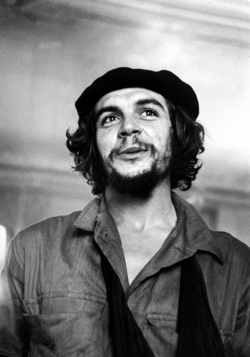Renato Guimarães
This article is incomplete because it is pending further input from participants, or it is a work-in-progress by one author. Please comment on this article's talk page to share your input, comments and questions. Note: To contribute to this article, you may need to seek help from the author(s) of this page. |
Renato Guimarães | |
|---|---|
 Guimarães pictured at the 5th Congress of the Revolutionary Liberation Front in 1939. | |
| 1st President of Maracao | |
| In office January 9, 1934 – May 16, 1944 | |
| Prime Minister | Josué Couto |
| Succeeded by | Josué Couto |
| Technical Secretary of the Revolutionary Liberation Front of Maracao | |
| In office April 19, 1932 – May 16, 1944 | |
| Succeeded by | Josué Couto |
| Personal details | |
| Born | Renato Maria Raúl Guimarães May 19, 1898 São João, Empire of Maracao |
| Died | March 13, 1945 (aged 46) Porto Leste, Maracao |
| Resting place | February 26th Mausoleum, Rozem, Maracao |
| Nationality | Maracan |
| Political party | Revolutionary Liberation Front |
| Spouse | Valéria Neves (m. 1920) |
| Children | 3 |
| Education | University of Porto Leste |
| Occupation | Author, guerrilla, politician |
| Military service | |
| Allegiance | Empire of Maracao (1928–1930) Revolutionary Liberation Front (1932–1934) Maracao (1934–1937) |
| Years of service | 1928–1937 |
| Battles/wars | Great War |
Renato Maria Raúl Guimarães (19 May, 1898 – March 13, 1945; aged 46) was a Maracan Nemtsovist revolutionary, philosopher, author, guerrilla and later politician who served as the inaugural President of Maracao from the establishment of the republic during the Great War in 1934 to his resignation in favour of Prime Minister Josué Couto in 1944. An ardent communist and believer of the economic and social teachings of Narozalic philosopher Yuri Nemtsov, Guimarães was the second Asterian revolutionary to violently overthrow or revolt against a prior government or state, behind Fedir Cheban's Revolutionary Chervolesia in 1916. Guimarães has historically and posthumously been commended for his commitment to democratic reform and social freedoms within Maracao, and was one of the first world leaders to establish full rights for women and the LGBT populace, as well as a pioneer in abortion rights and the reversal of the predominantly male-favouring social order of the 1930s and 1940s.
Born in the city of São João during Adelmar I's rule of Maracao to a military family, Guimarães grew up surrounded by military equipment and military history of Maracao. His father was a soldier of Adelmar's Empire and frequently left Guimarães, his mother and his three other siblings to attend to military duties across the island. Guimarães enlisted in the military in 1928 to assist in Maracao's defense against the Sotirian State of Marirana, and participated in the Sul Beach landing on the San Marcos peninsula in 1928, and later the battles of Lanuvio and Covancas, before escaping from the army in 1930. Developing anti-monarchist and anti-imperialist ideologies during the Mariranan occupation of the country, Guimarães would create the Frente Revolucionária de Libertação in 1932 and become influential in early Maracan resistance in the Great War throughout 1932. As the Entente began to be pushed back, Guimarães began open revolution against Marirana in the Liberação, playing a key role in Marirana's retreat from the island and the establishment of the Republic of Maracao in 1934. Guimarães was a draftee of the inaugural constitution and wrote most of it himself, basing it on the ideologies of Swetania and Chervolesia.
A largely polarising figure of the 20th century, he is both commended and lauded by both sides of the political spectrum. Many see him as a pioneer of democratic and social freedoms in the Asterias and Arucian, with his vision of the Maracan socialist state far exceeding the social norms at the time in aspects of human rights and personal freedoms. However he is also criticised for setting the precedent for the establishment of the current Maracan socialist republic, a state that is often blamed for destabilising the Asterias and the Arucian.